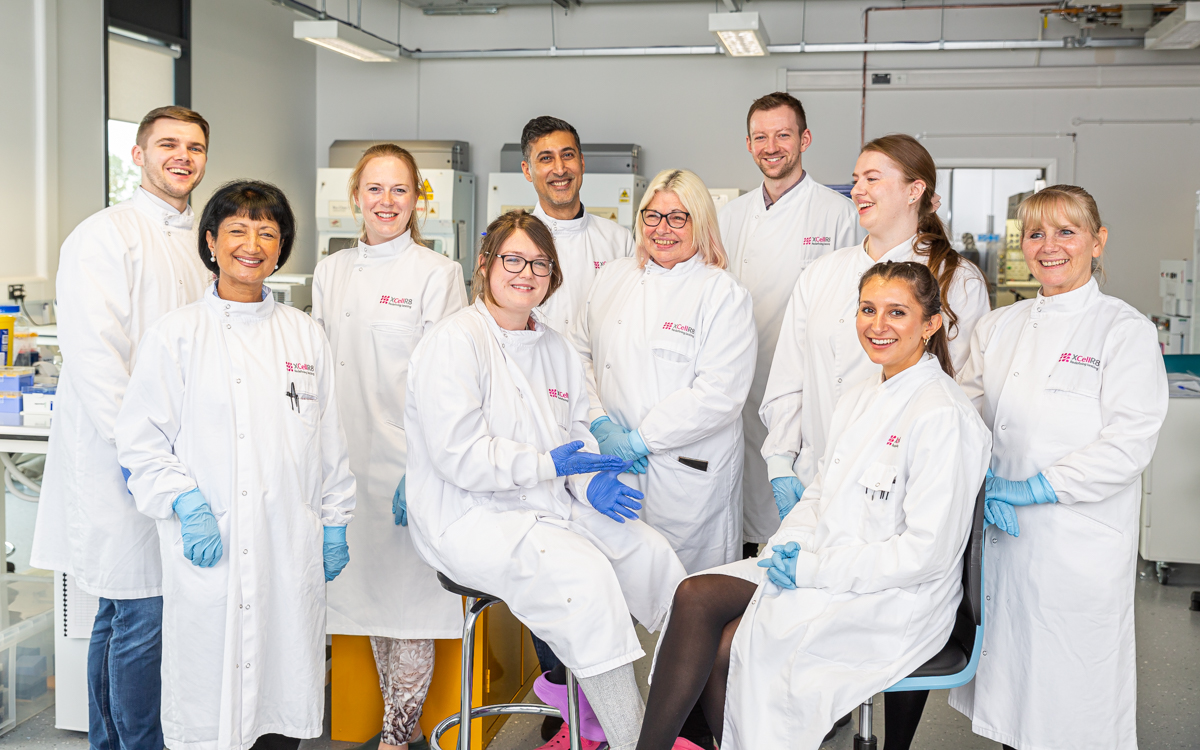SCI-TECH DARESBURY CELEBRATE MAJOR BREAKTHROUGH IN ANIMAL-FREE TESTING
Sci-Tech Daresbury’s XCellR8, the Liverpool City Region based laboratory company exclusively devoted to animal-free safety and efficacy tests for the cosmetics, personal care and chemical industries, has announced its new regulatory in-vitro safety test, Ocular Irritection®.

SCI-TECH DARESBURY’S XCELLR8 TEAM
The Ocular Irritection® test is a much sought after alternative to the Bovine Corneal Opacity and Permeability (BCOP), providing an equivalent level of scientific data and regulatory acceptance, but without the need to use bovine corneas from slaughterhouses or any other animal components, with results available in just four weeks.
The Irritection® technology was developed by InVitro International and XCELLR8 is the first company in the UK to offer this method (Ocular Irritection® OECD 496).
XCellR8, which has been located at Sci-Tech Daresbury since 2013, counts high street retail brands, large ingredient manufacturers and fast growth SMEs amongst its clients.
Many of its tests are for moisturisers, soaps and shampoos but also include household cleaning products and industrial chemicals.
The use of bovine eyes from slaughterhouses has led to much debate about the status of this test as an animal replacement method, and it raises concerns for companies developing vegan products and consumers seeking out more sustainable and ethical products with many companies will not commission or conduct the BCOP.
However, for chemical companies who need to comply with global regulations across a range of industry sectors, there has been little choice until now.
Ocular Irritection® offers a more scientifically and ethically advanced approach for identifying chemicals inducing severe eye damage and chemicals not requiring classification for eye irritation.

Dr Carol Treasure, co-founder and CEO of XCellR8
It works by modelling changes to corneal opacity and observing the effect of a test chemical on a macromolecular reagent matrix. The test can determine whether a substance causes severe eye damage and is a practical first step for a top-down or bottom-up approach to testing as defined in the OECD Guidance Document (GD) 263.
This is a Good Laboratory Practice regulated safety test, with an audited draft report available in four weeks and the final GLP report available in two to four weeks. The total time from day of dosing to final GLP report is six to eight weeks.
Dr Carol Treasure, co-founder and CEO of XCellR8 said: “The announcement of our new Ocular Irritection® test is a major breakthrough for all of us who want to see a world without animal testing.
“Over recent years, the growing availability of in vitro testing services has been pivotal in preserving the lives of countless animals while simultaneously improving the accuracy and reliability of tests that humans rely on to be sure that products are safe.
“However, the ongoing use of animal components in most of these tests compromises their human relevance and can affect the reproducibility of results — a factor that has not been generally considered until relatively recently.
“That coupled with the increasing consumer demand for vegan goods means that our Ocular Irritection® test is therefore a real gamechanger. This is a test completely free of animal products that does not compromise on quality or safety – what this means for a range of industries from personal care to chemicals is hugely exciting.”
John Downes, chief executive officer of Langtree and chairman of Sci-Tech Daresbury, said: “It’s testament to the expertise and dynamism of XCellR8 and the culture of innovation we’ve created on campus that such a landmark moment in animal safety has been created at Sci-Tech Daresbury.
“The Ocular Irritection® test is hugely important breakthrough at a time when how we treat the world around us, and our fellow inhabitants, has never been more important. It’s therefore a privilege for the campus to support XCellR8 on this latest stage of its very exciting journey.”
For more information visit: sci-techdaresbury.com/
